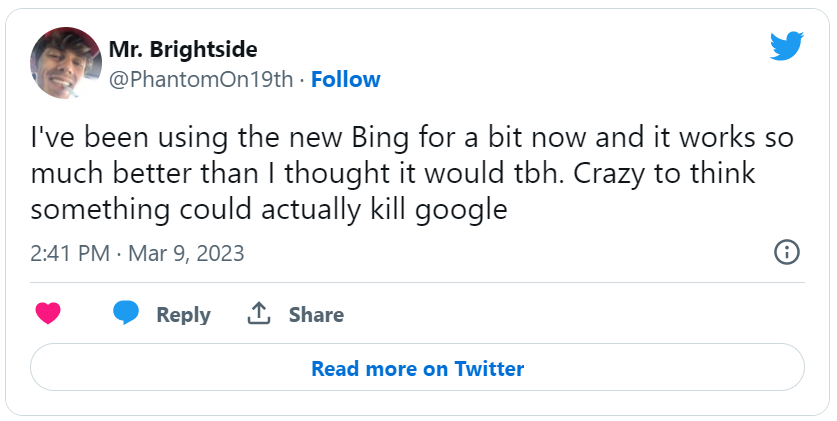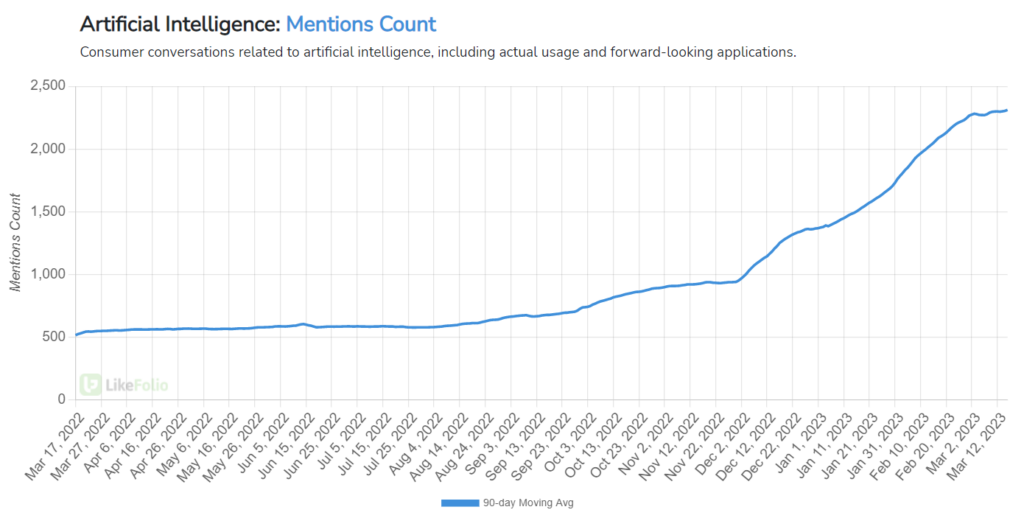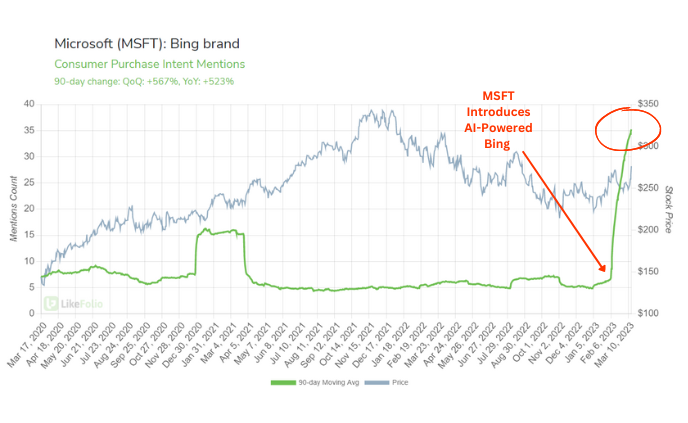If we had to name an official “buzzword” of 2023, it’d have to be artificial intelligence.
Mentions absolutely rocketed when ChatGPT opened the world’s eyes to just how real the application of AI could be.
And that trend has only accelerated over the last few months – with AI mentions currently surging 353% higher on a year-over-year (YoY) basis:

Similar to what we saw during the “Metaverse” mania of 2021, AI is an ambitious concept that many companies are scrambling to hitch their wagon to.
But if history is a good teacher, we know that the successful application of a booming consumer theme is harder than it looks.
Just ask Zuckerberg: After going all-in on the metaverse concept, Meta (META) lost north of $3.6 billion in October of last year building out its metaverse, with plans for spending to increase.
For AI, we’re watching all kinds of companies scramble to adopt and apply it to their own business models…
Snapchat (SNAP) even created an AI-driven chatbot that’s turned out to be a little… unhinged.
As in, parents – be concerned. This Twitter thread explains why (but please be aware it discusses sensitive content).
The race to integrate AI could easily be considered reckless.
But not all companies entering the AI race are employing a “move fast and break things” approach – some are recording meaningful improvements to core products.
And this company is leading the pack…
Leading the AI Race Is…
Microsoft (MSFT), of course – which announced a major step forward in February with its integration of OpenAI’s ChatGPT-4 language into Microsoft Bing and Edge.
GPT-4 is the successor to GPT-3, the technology behind ChatGPT, with the ability to produce human-level intelligence. GPT-4 is literally able to pass the bar exam and place in the top 10% of test takers.
But that’s not what has Microsoft so excited – it’s that this AI integration is driving consumers to actually use Bing, its formerly neglected search engine.
Check out the instant impact this integration had on Bing Purchase Intent (PI) Mentions, aka actual usage:
And users seem to be happy with the results, considering Bing Consumer Happiness levels climbed 12 points higher from 2022 lows after its release.

While an AI-powered Bing certainly won’t kill Google, as Mr. Brightside suggests, it could definitely shake things up… especially as the fight for advertising dollars escalates.
And Microsoft has AI application plans beyond its Bing search engine.
Earlier this week, Microsoft announced its intent to integrate AI into its Microsoft Suite 365 with Word, PowerPoint, and Excel. The AI feature is named Copilot and is operating on a type of AI software called LLM (large language model).
This integration is more sophisticated than a chatbot. The Word Copilot feature will literally draft content for users – though Microsoft warned that content might not be 100% accurate to start.
The Copilot tool can also generate PowerPoint slides, draft emails, and help create business proposals, all while personalizing it to the user by referencing past stored data (emails, meetings, chats, notes).
This feature is still in test drive mode for now. But it gives a promising glimpse into where Microsoft’s head is at – and where it could take AI next.
💰 Bottom line: Artificial intelligence can greatly improve user experience and productivity in the very real present and future when applied strategically (and safely).
And it looks like MSFT is off to a great start.
Until next,

Andy Swan
Co-Founder


